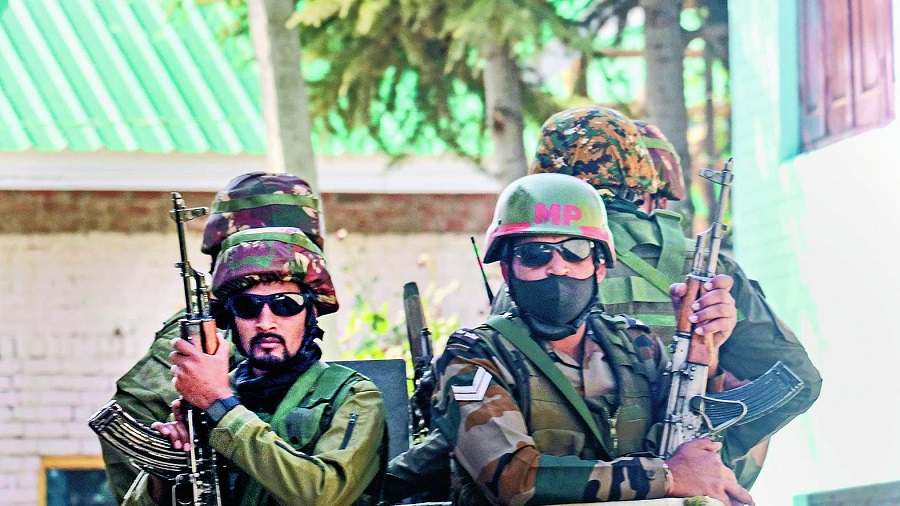For editors at The Kashmir Walla, fact-checking a story used to involve a flurry of Googling before press time. So when an 18-month Internet and phone shutdown began in Jammu and Kashmir in 2019, they had to improvise.
“We used to leave blank spaces in news stories when we couldn’t verify certain facts. Every week, a team member would fly to Delhi and fill in the blanks,” said Yash Raj Sharma, an editor with the weekly magazine.
It was one of numerous headaches for the region’s journalists. Unable to use his mobile, Sharma, 25, recalled driving to a telephone booth at Srinagar airport to dictate an 800-word news story to a friend in Delhi.
“That incident will remain with me forever as a memory of working during the longest communication and Internet shutdown,” said Sharma, who also used to call friends in Delhi to ask them to read out and respond to his emails.
The central government revoked the special status of Jammu and Kashmir on August 5, 2019. Anticipating major unrest, authorities imposed a communications blackout, cutting off phone and Internet connections.
The shutdown lasted until February 5, 2021, when 4G mobile data services were reinstated in the region. Slow-speed Internet had been restored a year earlier, but with limited access.
For older Kashmiris, it was a journey back in time to the pre-Internet days of their youth of letters and landlines.
For the young, it felt like “living in the Stone Age”, said Umer Maqbool, 25, who had taken out a bank loan to buy cameras and other equipment to set up a videography business in August 2019 — just as the shutdown began.
He got no bookings until the Internet was restored, and had to borrow from family and friends to make the loan payments.
“I had put all my hopes on the earnings from the business, but there was something else written in my destiny,” Maqbool, who supports a family of five, told the Thomson Reuters Foundation.
India shut off the Internet at least 106 times last year — the highest number of shutdowns globally for the fourth consecutive year, according to digital rights group Access Now, costing the economy an estimated $600 million.
Of these outages, at least 85 were in Jammu and Kashmir, largely on security grounds.
Elsewhere in the country, authorities have also shut off the Internet and mobile Internet during elections, protests, religious festivals and examinations.
It is “extremely easy” to suspend the Internet in India, as federal and state officers can do so “without any prior judicial authorisation”, said Krishnesh Bapat, an associate litigation counsel at the non-profit Internet Freedom Foundation.
“The suspensions are justified as ‘strong decisions’ in response to protests or cheating in exams or other law-and-order issues... despite there (being) little empirical evidence to suggest they lead to better law-and-order outcomes.”
The Union home ministry did not respond to requests for comment.
Internet shutdowns have become more sophisticated worldwide, lasting longer, harming people and the economy, and targeting vulnerable groups, according to Access Now, which recorded some 182 Internet shutdowns in 34 countries last year, up from 159 shutdowns in 29 nations the previous year.
India is one of the few countries in the world to have codified rules in 2017 under which the Internet can be shut.
And in 2020, the Supreme Court said that access to the Internet was a fundamental right, and that the indefinite shutdown of the Internet in Kashmir was illegal. It also said that all orders on Internet shutdowns must be made public.
Yet officials have continued to pull the plug — including in Kashmir — often without giving reasons, and the courts have rarely challenged the government, Bapat said.
“It is difficult to challenge the suspension of Internet services because by the time the aggrieved parties reach the courts, the Internet shutdown orders expire,” he said.
“But the legal challenges are needed because of the frequency with which the laws are flouted.”
Earlier this year, Calcutta High Court struck down an order by the Bengal government suspending Internet services in several districts, aimed at stopping students from cheating in the exams. In its judgment, the court said the order was “unreasoned” and did not show a public emergency.
There have been more than 400 Internet outages in Kashmir over the past decade, and shutdowns have become more frequent in recent years, a tracker showed.
During the 2019 shutdown, Kashmiris waited in long lines to make calls from phone lines in government offices, police stations and other public places, or boarded crowded trains to travel to towns with internet access.
With Internet speed restricted to 2G during much of the Covid-19 lockdowns, people struggled to work from home, attend online classes or even access healthcare information online.
It cost Jammu and Kashmir tens of thousands of jobs as small and medium-sized businesses closed, according to the Kashmir Chamber of Commerce and Industry, and took a heavy toll on young Kashmiris like Maleeha Sofi, 22.
The Monday that the shutdown began, she had planned to go to a college in Srinagar to check on the admission process. She eventually joined the college eight months later, and struggled with her classmates through the outages that made it difficult to do course work and prepare for exams.
“We have now become used to Internet shutdowns. We know it can happen anytime, so we have learned that we should never rely on the Internet, and learned to live without it,” she said.
But others have run out of patience with the disruption to their studies.
Insha, 22, moved to Delhi four years ago for college. “I couldn’t stay in a place where the Internet can get disrupted anytime -- for days and even months,” she said. “I didn’t see a future in Kashmir.”











